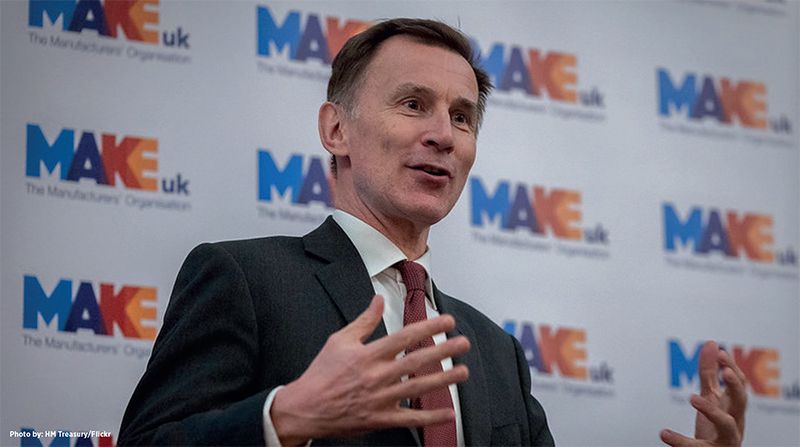With Rishi Sunak’s government causing consternation among financial services professionals last year for delaying aspects of their green policy and licensing new oil exploration, there is little optimism for tomorrow’s annual spring Budget in terms of fresh net-zero commitments.
However, industry spokespeople told PA Future there are still plenty of initiatives that could be introduced to boost the government’s green ambitions once again.
The spring Budget “presents yet another opportunity for the UK to respond to the US Inflation Reduction Act”, according to James Alexander, CEO at UK Sustainable Investment and Finance Association (UKSIF). as well as similar efforts in the EU and elsewhere, in the global race for investment to finance the net-zero transition.
“Our research shows 63% of UK energy companies plan to move investment abroad, but a step-change in government policy could unlock £115bn of new, private investment into the sector, which is the real prize for the green transition. This includes overhauling planning rules on large energy projects, increasing grid capacity and reforming energy pricing mechanisms,” Alexander continued.
“Such proposals don’t have huge price tags but require clear-sighted, long-term policy direction. This approach would assist in attracting private capital to finance the UK’s net zero transition elsewhere, too, such as targets to retrofit buildings and phase out high-emitting vehicles, while supporting individuals to retrofit their homes and transition to electric vehicles.”
Planning reform was also top of the agenda for Dan Wells, infrastructure partner at Foresight Group. He is anticipating further details on the chancellor’s commitments to “transform” the planning system, with the aim to reduce the time taken to decide on major infrastructure projects from four years to two and a half. Investment managers, he said, “need to understand the practical implementation of this ambitious initiative”.
“Against the backdrop of constrained public budgets, private capital stands ready to drive UK infrastructure development. However, investors seek assurances that these projects can deliver a viable return on investment within a reasonable timeframe.”
Policy and regulatory enhancements
Enhancements to the broad regulatory and policy landscape within the UK were also firmly on the watchlist for investors. Wells added this type of reform can enable UK institutional investors to “play a more significant role in mobilising capital” to achieve both the UK’s net zero and economic objectives in the coming year.
“This could include efforts to reform frameworks such as Solvency II, as well as provide more certainty on policy with respect to net zero, for instance by ensuring that policy pillars driving investment, like predictable carbon pricing mechanisms and improved energy efficiency standards for the private rented sector and UK housing will not be changed. If these planning and regulation reforms are delivered, they will unlock substantial opportunities for increased investment in the UK’s green energy industry, helping us to achieve our net-zero ambitions.”
Fergus Moffatt, head of UK policy at ShareAction, agreed. He said that, although the UK’s financial sector could be doing far more to address the serious environmental and social crises facing Britain, the budget represents an important opportunity for the government to bring forward measures to ensure financial institutions power the transition.
“As a priority, it should update pension trustees’ legal responsibilities to ensure they consider how investment decisions impact people and planet, alongside risk and return,” he specified.
Funding for low-carbon heat networks
Meanwhile, Ken Hunnisett, project manager of Triple Point Heat Networks, said he hopes further funding and policy interventions will serve to support the low-to-zero carbon heating sector, helping to hit its target of providing heating for one in five homes and workplaces by 2050.
“In December, the Department for Energy Security & Net Zero confirmed the Triple Point-managed Green Heat Network Fund would benefit from a further £485m of funding, but the sector won’t grow at the pace and scale required of it unless significant volumes of private capital can be mobilised.
“To unlock the £80bn predicted to be required by the sector – the lion’s share of which will be needed over the next 15 years – heat network zoning policy needs to be enacted in such a way that will provide meaningful network ‘demand’ assurance rather than just confidence in connections.
Like other low-carbon infrastructure classes, Hunnisett asserted the sector also needs a crystal-clear pipeline of opportunities and confidence in stable, secure returns. A revenue stabilisation model analogous to ‘Contracts for Difference’ in wind “would do much to improve the investability of heat networks over the coming years”.
“Lastly and most importantly, the price of low carbon heat needs to be effectively and permanently reduced to a level lower than high carbon heat,” Hunnisett concluded.
“The magic – particularly in today’s political and economic environment – will be in achieving that goal of price rebalancing without burdening the consumer.”








